Boris Johnson is facing pressure to speed up the nation’s exit from lockdown after he suggested pubs, bars and restaurants will be the final parts of the economy allowed to fully reopen amid a growing Tory backlash.
The Prime Minister said his roadmap, which he will unveil on Monday, will be ‘based firmly on a cautious and prudent approach’ to ease restrictions in ‘such a way as to be irreversible’.
It is thought the document will not allow the hospitality sector to get back to normal until July, a prospect which immediately sparked Conservative anger, with the PM under growing pressure from his backbenches to scrap restrictions as quickly as possible.
Mr Johnson appeared to confirm during a visit to a Welsh vaccination centre that punters face a long wait before they can take a typical trip to a bar or restaurant.
He pointed to the approach taken to easing lockdown last year and said ‘we opened up hospitality fully as one of the last things that we did because there is obviously an extra risk of transmission from hospitality’.
It is thought lockdown rules could be eased at four-weekly intervals after a ‘limited’ loosening at the Easter holiday, with the hospitality sector likely having to wait until early May for the green light to resume restricted trading.
But Tory MPs are adamant venues should be able to immediately resume trading on Covid-secure terms at Easter, labelling the prospect of lockdown rules still being in place as late as July as ‘ridiculous’ and arguing it would be impossible to justify if the vaccine roll-out continues its success.
Meanwhile, some scientists have questioned the slow speed of the reopening, arguing that the current data actually suggests measures could be lifted more rapidly.
Mark Woolhouse, professor of infectious disease epidemiology at the University of Edinburgh, said the vaccine roll-out and the protection provided by the jabs means ‘if you’re driven by the data and not by dates, right now, you should be looking at earlier unlocking’.
The PM’s comments came amid claims that the Government will not agree to a major easing of lockdown restrictions until new daily coronavirus case numbers are below 1,000, prompting accusations from Tory MPs of ‘moving the goalposts’.
Daily cases are currently above 10,000 and on the current trajectory they may not dip to three figures until April and that is before taking into account the potential impact on rate of infection of schools returning next month.
A senior Whitehall source told The Telegraph: ‘For any significant relaxation of lockdown, household mixing and reopening of pubs, case numbers have to be in the hundreds, not thousands.’
NHS Providers, which represents hospital trusts in England, echoed a similar sentiment as it claimed case numbers will need to be 14 times lower than they are currently before lockdown can be lifted and all over-50s should receive both doses of a coronavirus vaccine first.
However, Foreign Secretary Dominic Raab distanced the Government from the hundreds of daily cases target as he said ‘there is no single cast-iron formula or one particular indicator that above all other considerations can decide this’.
The blueprint being discussed by ministers and industry leaders would allow restrictions to be eased only at four-weekly intervals. The gradual approach means traders would have to wait until at least Easter – early April – for a limited restart.
This is likely to include the reopening of holiday lets and larger hotels, with dining rooms still closed. Sports such as golf and tennis could resume. Pubs, bars and restaurants will have to wait until early May under the plans, with a maximum of two households allowed to sit together indoors and the rule of six applying outside.
The next stage, in early June, would see the rules for pubs and restaurants relaxed with the rule of six extended indoors. The hospitality and domestic holiday industries could be allowed to return to normal in July – with social distancing.
The latest roadmap news came as it was claimed that the Government will soon unveil a mass-testing campaign which would see 400,000 rapid tests posted to homes and workplaces everyday.
Ministers hope the campaign, with the slogan ‘Are you ready? Get testing. Go’ will launch before schools reopen on March 8 and will help to get life back to normal.
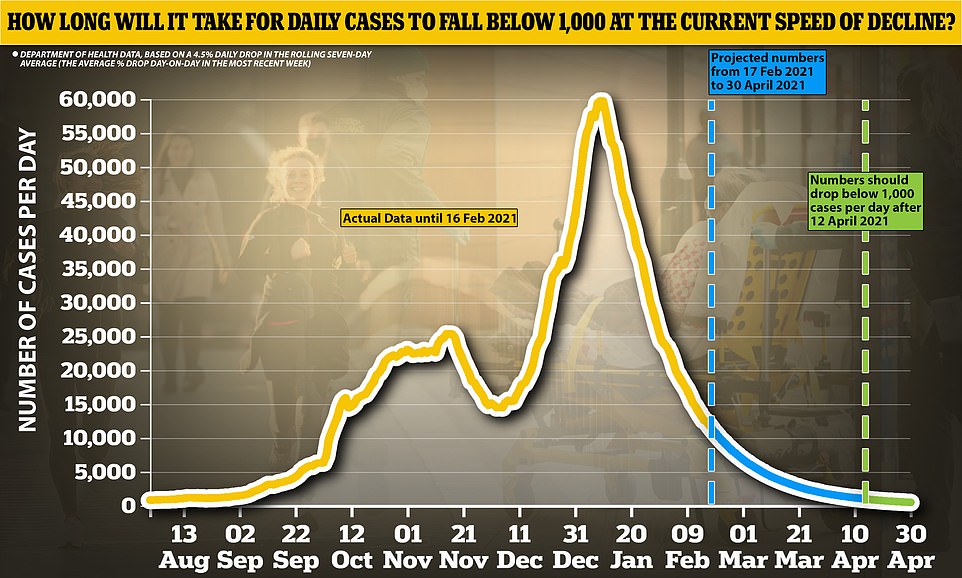
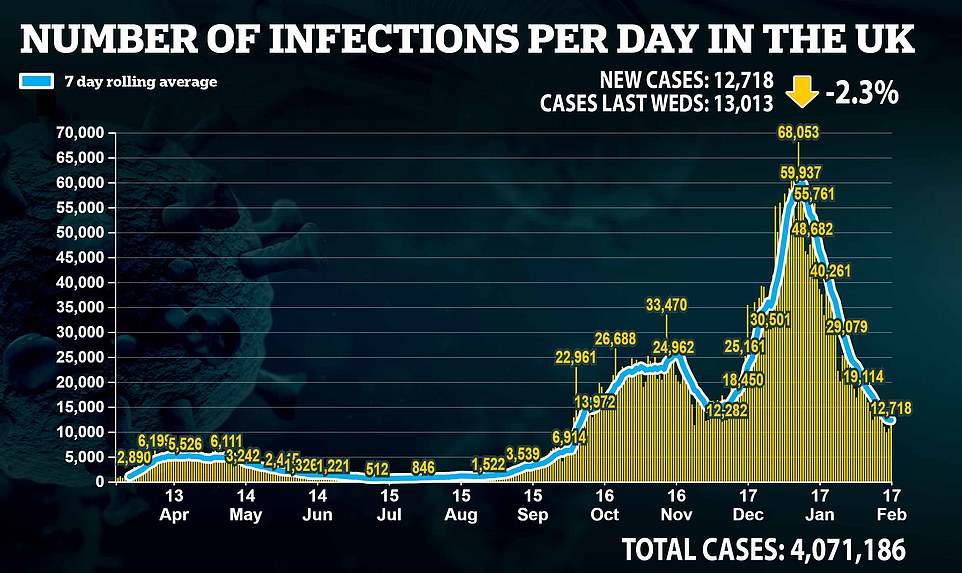
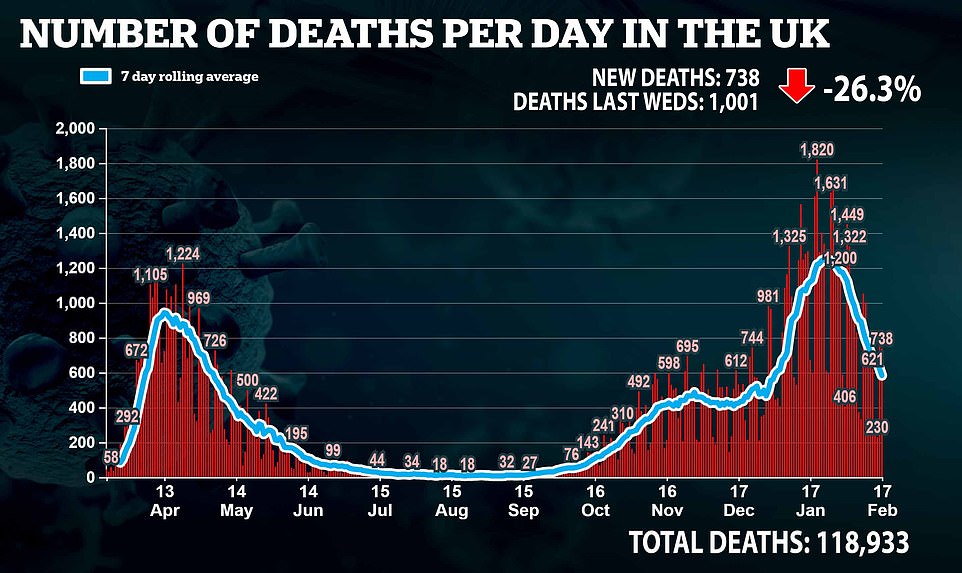

The gradual approach would mean traders will have to wait until at least Easter – early April – for a limited restart
No10’s blueprint for escaping lockdown
The roadmap for easing lockdown will be unveiled on Monday, setting out the order in which rules will be lifted and the target dates.
Here’s what we know so far:
March 8 – Schools open;
End of March/start of April – non-essential shops reopen;
Early April – Sports such as golf and tennis resume; holiday lets and larger hotels reopen;
Early May – Pubs, bars and restaurants welcome customers, with a maximum of two households allowed to sit together indoors and the rule of six applying outside.
Early June – Rules for pubs and restaurants relaxed with the rule of six extended indoors;
July – Hospitality and domestic holiday industries can operate as normal – but still with social distancing.
Advertisement It’s carry on working from home! Staff will still be told not to return to their offices even as infections fall
Office staff are set to be told to keep working from home even as other lockdown restrictions are eased.
Boris Johnson is not expected to give a firm date for when workers will return to their desks as he unveils his plans for a return to normality on Monday.
It means the ‘work from home if you can’ message will continue to guide employers for the foreseeable future.
But ahead of any return, companies are reportedly drafting ‘no jab, no job’ contracts to force staff to get Covid-19 vaccinations.
Bosses in the care home sector as well as large international groups including an energy firm are making arrangements, top lawyers warned.
Advertisement NHS chiefs say Covid cases must be 14 times lower before lockdown can be lifted
The number of coronavirus infections needs to plummet to under 50,000 before Boris Johnson can consider easing lockdown, an NHS leader has warned.
The most recent figures suggested that 695,400 people in England had coronavirus in the week ending February 6.
NHS Providers chief executive Chris Hopson said there was a ‘pretty clear view’ that ‘that number needs to come down to around 50,000’.
He has urged Boris Johnson to focus on ‘data, not just dates’ when the Prime Minister sets out his road map out of lockdown on Monday.
Mr Hopson’s organisation, which represents NHS trusts, has set out four ‘tests’ which should guide easing: getting case numbers down, reducing pressure on the NHS, further strides in the vaccination programme and an effective strategy to control future outbreaks.
‘If you look at where we are against those four tests, each one of them tells you that we’re still some way away from being able to start relaxing restrictions,’ Mr Hopson told BBC Radio 4’s Today.
‘We had 500 Covid patients in hospitals in September and yet, 15 weeks later, we had 34,000 patients, and we were perilously close to overwhelmed.
‘So, what that says to you is that you just need to be really careful before you start relaxing the restrictions prematurely.’
Advertisement
The latest coronavirus developments came as:
Mr Raab said ‘we need a global solution to a global pandemic’ when asked about the UK redistributing its vaccine supply to other countries. The Foreign Secretary said increased rapid lateral flow testing meant that ‘when you do have upticks of the virus, we can come down on it like a tonne of bricks’. The Government announced the world’s first coronavirus human challenge study will start in the UK next month as scientists try to determine the smallest amount of virus needed to cause infection. Professor Mark Woolhouse, professor of infectious disease epidemiology at the University of Edinburgh, said he does not expect a surge in cases when schools are reopened. Professor Woolhouse also claimed that the Government ‘probably could have considered reopening schools much sooner in the first lockdown’. Professor Dame Angela McLean, chief scientific adviser at the Ministry of Defence, told the Science and Technology Committee that high case numbers in South Africa where it is currently summer ‘tells us it is possible to have a horrible wave in the summer’.Professor Sir John Bell, Oxford’s regius professor of medicine, said the vaccine roll-out is likely to result in new coronavirus variants emerging as a result of ‘immunological selection’.Sir John also said it was ‘not plausible’ to expect people to live with major restrictions after the vaccine rollout is complete.NHS England said a further 522 people who tested positive for coronavirus have died in hospital in England, bringing the total number of confirmed deaths reported in hospitals to 80,115.A total of 13,891,042 Covid-19 vaccinations took place in England between December 8 and February 16, a rise of 315,797 on the previous day’s figures.
Ministers will not make a final decision on the roadmap timetable until this weekend when they are presented with the latest data on the spread of the virus.
The measures under consideration appear to confirm that the PM is determined to be cautious, with plenty of ‘headroom’ to adjust to any resurgence of the virus.
The fact that the rule of six and social distancing are expected to remain in force until well into the summer indicates the extent of the worries over new mutations.
The Mail can also reveal that office staff are expected to be told to keep working from home when the Prime Minister unveils his roadmap.
He is not expected to set a firm date for when employees should return to their desks, meaning that the ‘work from home if you can’ message will continue for the foreseeable future.
Many Tory MPs believe the success of the vaccine roll-out should allow all lockdown rules to be lifted by the start of May.
Speaking at a mass vaccination centre at Cwmbran Stadium in Cwmbran, south Wales, Mr Johnson said his roadmap will be informed by data and not dates.
He said: ‘I do think that that is absolutely right and that is why we will be setting out what we can on Monday 22nd about the way ahead and it will be based firmly on a cautious and prudent approach to coming out of lockdown in such a way as to be irreversible.
‘We want to be going one way from now on based on the incredible vaccination roll-out that you’ll see here in Cwmbran.’
Asked if he agreed with NHS Providers on the suggestion that case numbers need to fall substantially before things like pubs can reopen, Mr Johnson replied: ‘I certainly think that we need to go in stages, we need to go cautiously.
‘You perhaps remember from last year that we opened up hospitality fully as one of the last things that we did because there is obviously an extra risk of transmission from hospitality.
‘But we will be setting it all out on Monday and I know there is a lot of understandable speculation in the papers and people are coming up with theories about what we are going to do and what we are going to say about rates of infection.
‘I would just advise everybody, just wait, we will try and say as much as we can on Monday.’
The hospitality industry has rejected the claim it is a ‘significant area of transmission’ and is calling for venues to be reopened at the same time as non-essential retail.
UKHospitality chief executive Kate Nicholls said: ‘The result of the lockdowns and the restrictions placed on the sector last year was crippling. Business was devastated to an extent hitherto unimaginable. Many businesses are barely surviving and cannot afford another year with restrictions on the scale of 2020.
‘Reopening has to be done correctly at the first time of asking. A barrier to that could be the incorrect assumption that our businesses pose a risk to public health. We know that hospitality businesses are safe and all the data has shown we are not a significant area of transmission.’
Earlier, Mr Raab was asked this morning on LBC Radio if it was his understanding that daily cases would need to be below 1,000 before a major reopening of society is given the green light.
He replied: ‘No, there are always these snippets in the lead up to a key moment like next Monday.
‘The number of cases is important, so is the R level, it is good to see the R level is now below one.
‘There is the pressure on the NHS, there is the roll-out of the vaccine and actually there are some important indicators that we will look at but you have to take a rounded judgement on it.’
He added: ‘There is no single cast-iron formula or one particular indicator that above all other considerations can decide this.
‘So we will look at all of the indicators, all of the evidence. We know that the vaccine has had a significant role.
‘You can see from the seven day data on cases, hospital admissions and fatalities that we are in the right direction and the PM will set the roadmap out on Monday.’
On the suggestion that the Government will soon be posting 400,000 rapid lateral flow tests to homes and workplaces everyday, Mr Raab said: ‘We have got ambitious targets in relation to testing which we have met at various points, as well as the vaccine rollout.
‘And we are absolutely doing everything we can to meet those targets. They are obviously designed to be challenging, because we want to get people out of the current lockdown as soon as possible.
‘The only way to do that is responsibly, safely – that’s the way we make it sustainable.’
The suggestion overnight that lockdown may not be loosened until there has been a dramatic reduction in case numbers immediately prompted a Tory backlash.
Sir Graham Brady, the chairman of the influential 1922 Committee of Conservative backbench MPs, told The Telegraph: ‘The presumption should be that people are given back control over their own lives and we move from a world of arbitrary regulation to one where we are able to take responsibility for ourselves and each other.
‘We cannot allow the goalposts to be moved every time we are about to reach freedom.’
Tory MP Peter Bone told MailOnline he believes many pubs will close for good if restrictions are not lifted soon and that the Government’s roadmap must be put to a vote in Parliament.
He said: ‘I think Easter is the right time to open the pubs and restaurants in a Covid-secure manner – assuming the vaccine programme continues as it is and assuming there are no left-field events like a major new variant.
‘The basic point should be we should have freedom and unless the Government can prove that they need to keep the restrictions then the fallback position should always be the freedom, not the regulations.’
One senior Tory MP said the idea of rules still being in place as late as July is ‘ridiculous’, adding: ‘The aim should be to open all businesses as soon as it is safe to do so. At the moment the attitude seems to be that we can be certain there will be no more Covid cases, but that is not reasonable.’
Another Conservative MP said the PM appeared to be adopting a strategy of ‘under promise and over deliver’.
They said: ‘If the pubs don’t reopen soon many people will be crying and unfortunately not into their beer. How do you justify it when all over-50s will have been vaccinated?’
It came as NHS Providers urged Mr Johnson to proceed with caution when he does set out his plan next week for lifting restrictions.
The latest official figures from the Office for National Statistics suggest about 695,000 people in England currently have Covid on any given day.

There are signs the UK’s coronavirus vaccine roll-out may be slowing after fewer than 280,000 doses were administered yesterday
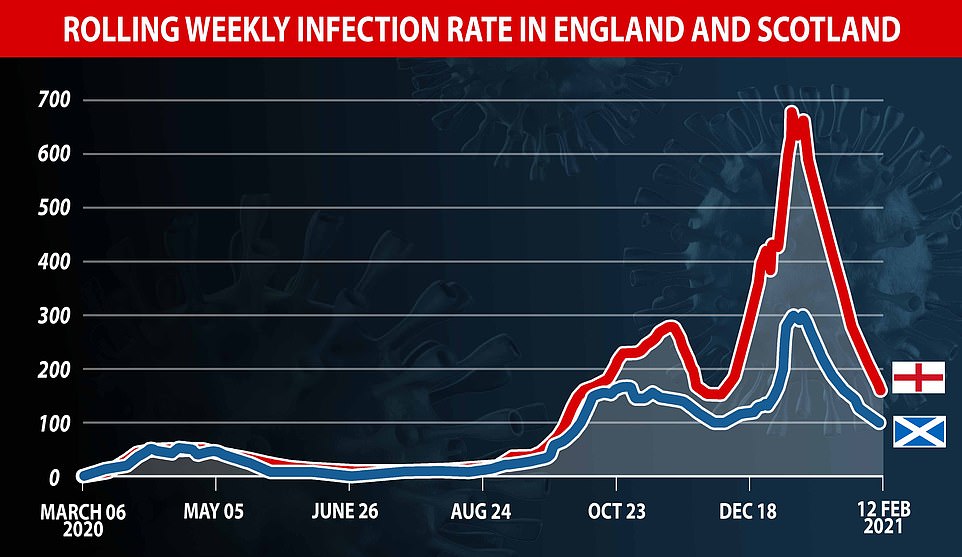
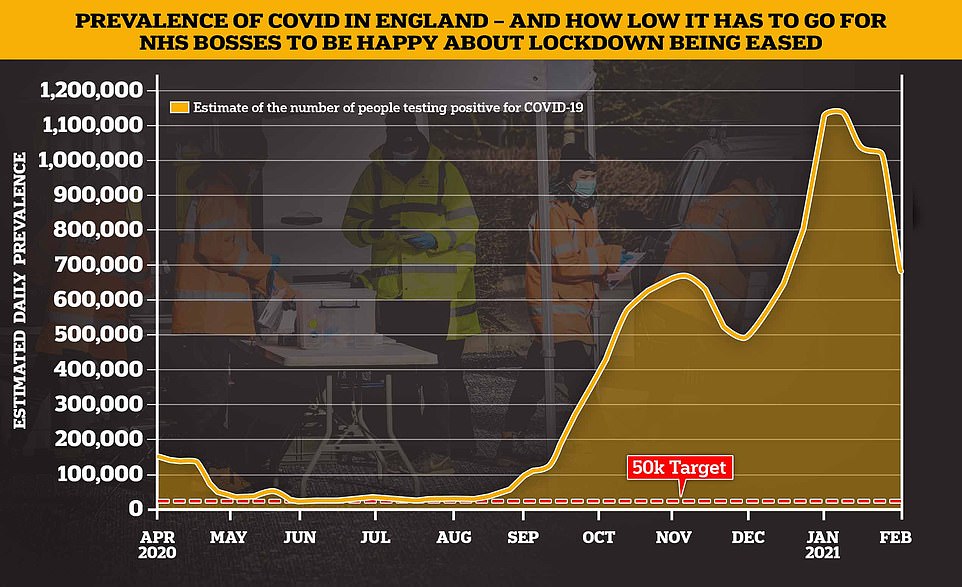
Expert claims Covid data shows PM could agree to ‘earlier unlocking’
Mark Woolhouse, professor of infectious disease epidemiology at the University of Edinburgh, has argued the current coronavirus data points towards an ‘earlier unlocking’ of society.
Giving evidence to the Science and Technology Select Committee, he said the Government should be ‘focused on dat’ and the ‘data are going really well’.
He said the vaccination roll-out, and the protection provided by jabs, could allow Boris Johnson lift draconian curbs more quickly.
He said: ‘The transmission blocking potential is key. But so, of course, is its actual ability to protect against death and disease, and to keep people out of hospital, and those numbers are looking really good.
‘My conclusion from that is if you’re driven by the data and not by dates, right now, you should be looking at earlier unlocking.’
He argued the Government was too slow to reopen schools and outdoors activities after the first lockdown.
‘Those two things, I think, could have been relaxed sooner in the first lockdown,’ he said.
Prof Woolhouse said evidence shows the ‘virus is not transmitted well outdoors’ and there has never been a Covid-19 outbreak linked to a crowded beach.
He said: ‘Over the summer we were treated to all this on the television news and pictures of crowded beaches, and there was an outcry about this.
‘There were no outbreaks linked to crowded beaches, there’s never been a Covid-19 outbreak linked to a beach ever anywhere in the world to the best of my knowledge.’
He said that mass gatherings – such as a horse racing event – are an exception because they do not involve social distancing and there are ‘pinch points’ like travel and refreshment facilities.
‘I think we do have to understand where the risks are so that we can do as much as possible safely,’ he added.
Advertisement
Chris Hopson, chief executive of NHS Providers, which represents trusts across England, said that ‘number needs to come down to around 50,000’. Other SAGE experts have called for ministers to wait until it drops to 10,000.
He told the BBC Radio 4 Today Programme: ‘When you are hearing people say ‘all restrictions off by the end of May’, we think that feels very premature. We can only see the beginnings of lockdown easing on that timescale.’
With the second wave firmly in retreat and the vaccination drive a roaring success, Mr Johnson is under pressure from Tory backbenchers for a swift relaxation of measures in the coming weeks, when vulnerable Brits will all have had their first jab.
But Mr Hopson highlighted that in Israel, hospital admissions have started to rise in younger age groups now that the old and vulnerable have been jabbed.
In Israel, people are getting their second vaccine dose three weeks apart compared to three months in the UK.
He warned that opening up Britain without giving everyone over 50 both doses would risk spikes in hospitalisations that could push the NHS to the brink again.
NHS Providers is calling for the significant reduction in cases and hospital patients, all over-50s to get both Covid vaccine doses and a levelling up the Test and Trace scheme to be able carry out rapid genomic sequencing to quickly spot dangerous new variants.
Mr Hopson told the Today programme: ‘We had 500 Covid patients in hospitals in September and yet, 15 weeks later, we had 34,000 patients, and we were perilously close to overwhelmed.
‘So, what that says to you is that you just need to be really careful before you start relaxing the restrictions prematurely.’
He said he did not want to speculate what level case numbers should reduce to before restrictions were lifted but he cited ONS data which estimates that 695,400 people in England have Covid-19, adding: ‘I think there is a pretty clear view is that number needs to come down to around 50,000.’
It comes after a report last night warned NHS waiting lists could hit a record 10million by April – with one in six people in England needing treatment.
Researchers claimed that the pandemic turned the NHS into the ‘National Covid Service’, with six million fewer referrals in 2020 than 2019.
It could see the waiting list rise from 4.52million as of the end of December to ten million by April, modelling by the Reform think tank and data analytics firm Edge Health suggest.
The number waiting on the list for more than a year is also expected to be 12,000 per cent higher by April than last March.
Health charities and the Royal College of Surgeons last night warned that patients face the ‘grim reality’ of long waits for ‘years to come’.

Sports such as golf and tennis could resume. Pubs, bars and restaurants will have to wait until early May under the plans, with a maximum of two households allowed to sit together indoors and the rule of six applying outside
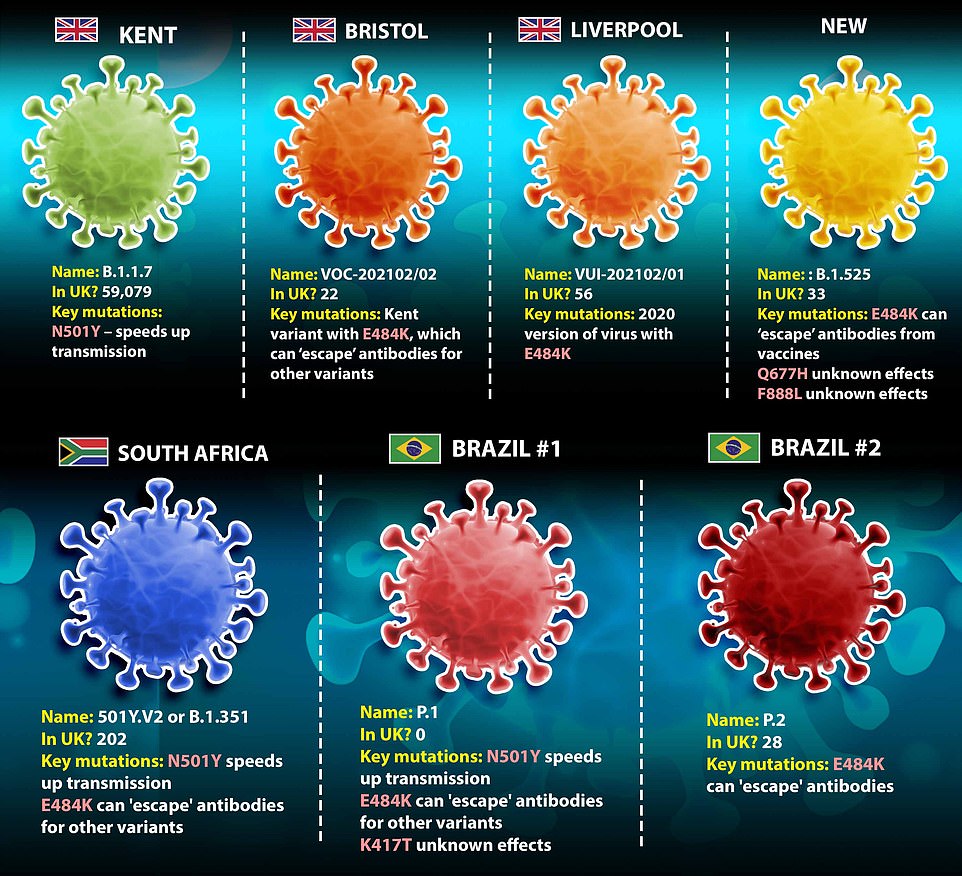

The above map shows where the strain B.1.525 has been detected in the world. It was first identified in the UK and Nigeria in late December
Government scientific adviser warns UK could face a ‘summer wave’ of Covid infections
One of the Government’s most senior scientific advisers has warned the UK could face a summer wave of coronavirus infections.
Professor Dame Angela McLean, chief scientific adviser at the Ministry of Defence, said the situation in South Africa showed spikes in infection may not only be confined to colder months.
It is currently summer in South Africa but the country has still been dealing with a second wave.
Asked during an appearance in front of the Science and Technology Select Committee if Covid-19 could become a seasonal illness, she said: ‘We might not expect to see seasonality – that would become very important later on, once it’s an endemic infection.
‘I would expect it to become a seasonal infection, it will become one of those things that hits us in the new year would be my guess.
‘That does not mean that we can’t have a summer wave.
‘It is currently summer in South Africa where they have had second wave, so I think that tells us it is possible to have a second wave in the summer.’
Advertisement
But Mr Hopson said this morning that ‘trumpeting’ worst-case scenarios about the NHS waiting list ‘isn’t particularly helpful’.
Asked about the report, he added: ‘There is a significant issue here but we’ve got to be really careful not to exaggerate things.
‘In June 2020 another organisation, using virtually exactly the same methodology, said that the NHS waiting list would hit exactly this figure of 10 million by last December – that didn’t happen.
‘Actually the waiting list is 4.4 million – that’s a very big waiting list but it’s nowhere near 10 million.
‘We just need to be careful about over-exaggerating what is a very significant problem and will take investment and time to overcome.
‘In my personal view, trumpeting worst-case scenarios to get some newspaper headlines at the NHS’ expense isn’t particularly helpful.’
The rapid roll-out of the vaccine had boosted optimism that Mr Johnson will announce that the long winter lockdown can be lifted sooner than expected.
It was claimed yesterday that the NHS will receive enough vaccine doses to jab everyone over 50, or 32million people, by the end of March – a full month ahead of schedule.
Almost one in four Britons has now had at least one jab and experts yesterday said the UK’s vaccination programme was reducing coronavirus deaths among the over-80s.
However, the blueprint revealed by the Mail today is likely to be seen as more cautious than many in the hospitality and leisure sector were asking for.
They had warned that businesses would go under unless they were allowed to get going again from the Easter weekend.
The new route map, the most detailed outline of the Government’s thinking so far, lays out how vast swathes of the UK economy will reopen.
As already widely reported, schools will reopen from March 8, along with an easing of the restrictions on outdoor exercise and meeting others outdoors, followed by the reopening of non-essential shops at the end of March, or at the start of April at the latest.
Under plans discussed with industry figures, staycations in self-catered holiday lets, second homes or larger hotels would return in the first half of April, potentially just after Easter.
Outdoor leisure, such as theme parks, public gardens and zoos, and outdoor sports such as golf, open air gyms and tennis would get the go-ahead at the same time.
This ‘soft opening’ of the economy would then be followed with a loosening of restrictions every four weeks if case numbers and hospital admissions continued to fall.
An industry source said: ‘The suggestion is that we would broadly go back to normal in late June or July.’
Other insiders believe decisions could be taken at three-week intervals, as this is the time that it takes for the data to demonstrate the effect of the lockdown loosening.
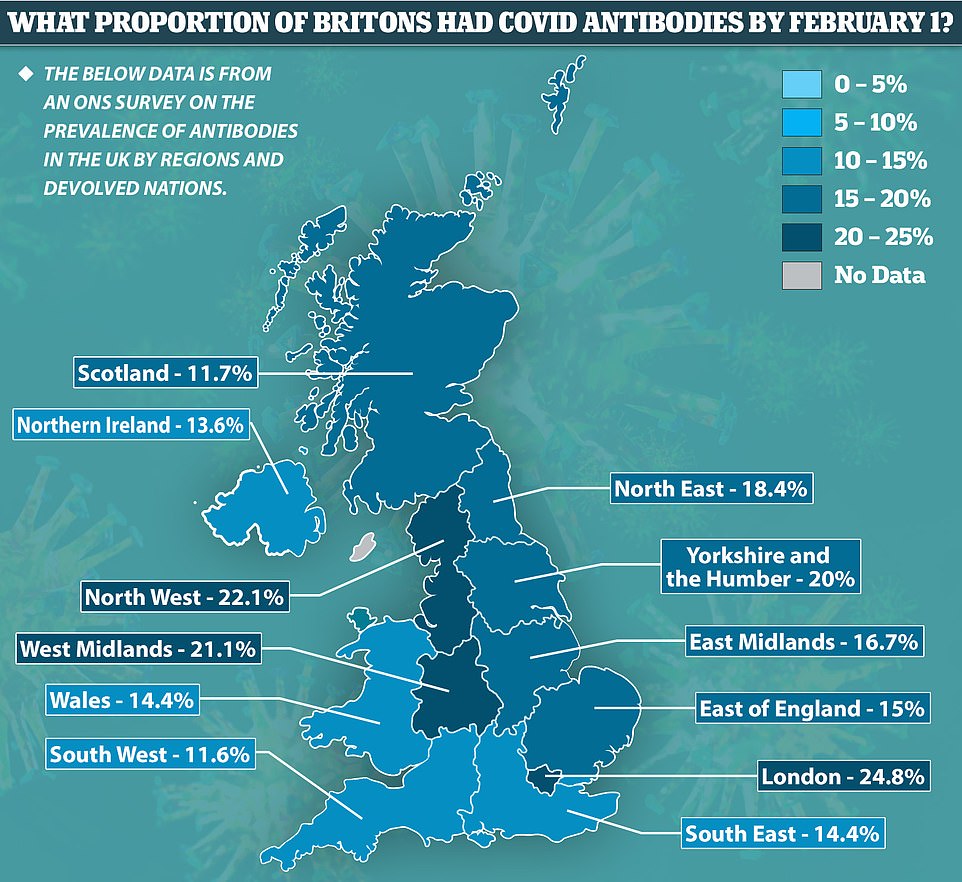
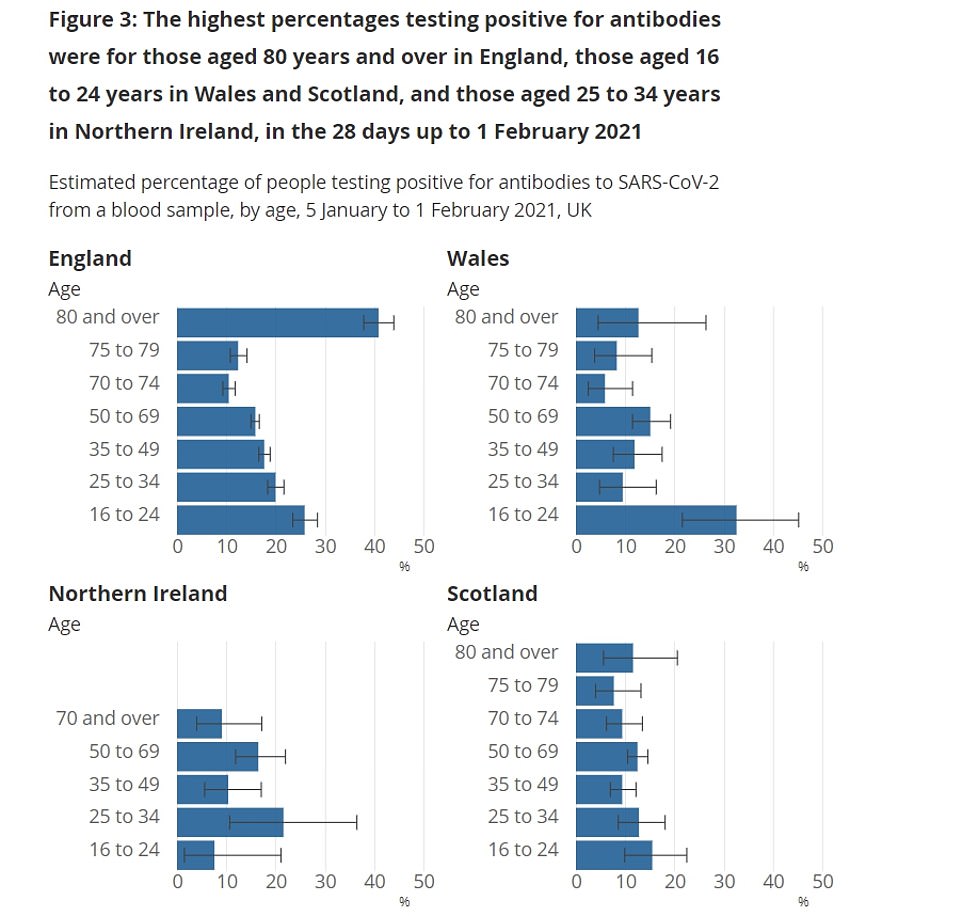
Wetherspoon boss Tim Martin has called on the Government to reopen the nation’s pubs at the same time as non-essential shops
A full reopening is not expected until May at the earliest, with Mr Martin warning the industry is ‘on its knees’ and venues must be allowed back to save jobs.
Mr Martin spoke of the huge contribution pubs make to the economy, saying: ‘In the financial year to July 2019, before the pandemic, Wetherspoon, its customers and employees generated £764 million of taxes – £1 in every thousand collected by the UK Government.
‘Many people have correctly pointed out that the three lockdowns of the last year have been a disaster for the hospitality, retail, arts and entertainment industries, but our calculations show that they have been an even bigger disaster for public finances.
‘The taxes paid by Wetherspoon are mirrored by thousands of companies which have been annihilated by lockdowns. As a result, government finances have been annihilated even more.’
Meanwhile, some companies have begun drafting ‘no jab, no job’ contracts to force staff to get Covid-19 vaccinations despite lawyers warning they are ‘risky’ and likely to be challenged.
Bosses in the care home sector as well as large international groups including an energy firm are making arrangements, top lawyers warned.
The move could mean both prospective and current employees would need to have the coronavirus vaccine to work at an organisation.
Asked about businesses who introduce a scheme, vaccines minister Nadhim Zahawi said it was ‘up to them’.
Source link : https://www.dailymail.co.uk/news/article-9269163/Hospital-bosses-call-lockdown-SUMMER-cases-need-drop-tenfold.html











